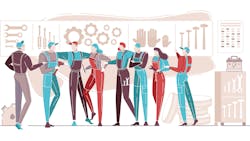What do you get when you call a shop meeting but a text or an email would’ve worked just as well? You get frustrated technicians; ones with a sour taste in their mouths. And nobody wants that as part of their overall shop strategy.
So, as an owner or manager, if you’re thinking about holding a team meeting, ask yourself: Do we truly need a meeting about this?
Here’s the expert reasoning behind why shop owners should put on the brakes and consider this simple but important question before they jump into group meeting mode.
“If you’re going to have a meeting, have a solid purpose and let people know the purpose of the meeting,” says Chicago-based psychologist and executive coach Lisa Kaplin, an expert in how to hold meetings that strengthen team unity and operations in any industry.
“If you didn’t truly need the meeting, staff won’t pay attention and they won’t trust you next time if it didn’t truly need to be a meeting,” she notes. “And then next time they’ll show up with a negative, waste-of-my-time feeling.”
So, what’s a legitimate reason for holding an automotive quick lube or repair shop meeting, in particular?
Make the Call
According to Kaplin, any major change in procedure or any time where you need feedback or input from your team, those are good reasons to hold a meeting.
“Especially if you’re changing something operationally or procedurally, that’s a good time to have a meeting,” she explains. “And then you can walk people through the changes so it’s not confusing.”
But what if, as an owner or manager, you really just want to check in with your team and get everyone all together? Will that fly? And can a simple check-in meeting ever be something more than a bumpy ride for the techs who have to stop what they’re doing and listen to you?
Yes, according to Kaplin, if you first set expectations that it’s that kind of meeting. That way, your employees don’t come in expecting a big deal and leave feeling like it was a waste of their time.
Whether it’s a check-in type of meeting or one about a critical change in shop procedure, though, there is a magic window of time to shoot for: “A half-an-hour or less,” Kaplin states.
“And if you’re going to call the meeting for 10 minutes, don’t go longer,” the executive coach advises. “Again, properly manage people’s expectations.”
The trouble is, 10 or 15 minutes can whiz by in a blur—so fast you easily lose track of time.
So, Kaplin suggests that a good way to stick to a short meeting time without going over is to hold the meeting with everybody standing up.
“This is actually a very good type of meeting for this audience,” she says of auto and quick lube techs.
Balance the Focus
Sometimes an owner or manager needs to hold a meeting about something that’s not good news, though. Maybe sales are down or some roles are changing and everybody won’t be happy about it— what then?
Obviously, negative news shows up at every shop sometimes, but Kaplin says to make certain that’s not the only time you hold meetings—when something has gone wrong or is disheartening.
“If you only ever meet to give your employees negative information, then why would anybody want to come?” Kaplin puts it.
“So make sure you share good news and have positive meetings along with the ones where you tell them about changes that have to be made, for instance,” she advises.
Last of all, if you want to make sure your meetings don’t chronically stink, make sure you make a point to focus on wins, when you can.
“Say, ‘Let’s take a moment and talk about our wins,’” Kaplin suggests. “Maybe sales were up, or you can even ask your team members to give a win they can share for somebody else.”
The result on team morale? You will likely steer your team straight into a positive and productive mindset—one that sends them back to the bays with solid information they can use—and that’s sound shop strategy.
About the Author

Carol Badaracco Padgett
Carol Badaracco Padgett is an Atlanta-based writer and NOLN freelance contributor who covers the automotive industry, film and television, architectural design, and other topics for media outlets nationwide. A FOLIO: Eddie Award-winning editor, writer, and copywriter, she is a graduate of the University of Missouri School of Journalism and holds a Master of Arts in communication from Mizzou’s College of Arts & Science.
